A Conversation with Casey Dienel on Art, Autonomy, and Quiet Ritual
Series Debut: Conversations Behind the veil 001
In the first edition of my new series Conversations Behind the veil, I was blessed to speak with artist and friend Casey Dienel. She writes one of my favorite Substacks, Notes from Lantern House. It’s magically introspective and creatively poetic. In our convo, she reflects on stepping away from the music industry, disentangling self-worth from productivity, and the quiet rituals that keep her tethered to the sacred in her creative life.
This series is a space for honest, unguarded dialogue with fellow artists and writers—where we explore the invisible threads between us. We talk about topics like creativity, queerness, spirituality, neurodivergence, chronic illness, and what it means to keep making work while the world asks us to fracture ourselves. These aren’t interviews; they’re tender exchanges. A meeting place for what lives beneath the surface.
Content Note: This conversation addresses mental health struggles, burnout, and the pressures of the music industry, including critique of its exploitative practices. It may be triggering for some readers. Please read with care.
vōx: Casey! Thank you so much for joining me. Shall we start with a bit of background on our friendship? I remember being at an Anna Wise show in Brooklyn many moons ago. Perhaps it was 2017? We sat down next to each other at the bar, got to chatting, and I immediately felt a kindred spirit. For me, this has been a common occurrence when meeting fellow neurodivergent artists. Neither of us knew we were neurodivergent at the time, though! I just thought, "Boy, is she cool. I want to step inside her brain." Do you have any first meeting memories to share?
Casey Dienel: Yeah, it was Anna's residency at C'mon Everybody. I was there to see my friend's band, Deradoorian, and I immediately regretted showing up late when we met. I was so curious about what your music would sound like, and astonished to find this wondrous sound coming from such a soft, thoughtful person. Such a Capricorn move! I thought you were incredibly chic, poised, and cool—but I can confidently say I didn't feel cool or terribly bright that evening. I have what friends call my 'resting confidence face.' I may look sure of myself, but I'm a quiet wreck in most social settings.
I invited you for tea, and you wore this great fuzzy coat. Like a teddy bear. Underneath something pale and spectral, like gauze. I was such a bad New Yorker. I always bring people to my place instead of meeting them out. For a peripatetic person, I do better in a 1:1 setting.
vōx: I feel quite the same in a social setting. Like, what is happening?! A one-on-one is the only time I truly thrive socially.
I also get so bored by the type of small talk necessary when out in social settings. I feel like I’m floating out of my body. It’s probably why I liked you right off the bat, as I’m sure we were testing the waters early on to see if the other person was down to stop the frivolities and go deeper.
You were someone I looked forward to visiting whenever I had a work trip to NYC because you were down for a backyard garden hang just the two of us! And you always had the most beautiful, aesthetic snacks.
We met when my project was so new. I was still growing into vōx, the character, the persona. There was still such a divide between Sarah and the performer. Now, there’s much less of a difference. I think not only did I grow more into the confidence of vōx, but I also started sharing more of myself, my vulnerabilities, and my soft spots, through her.
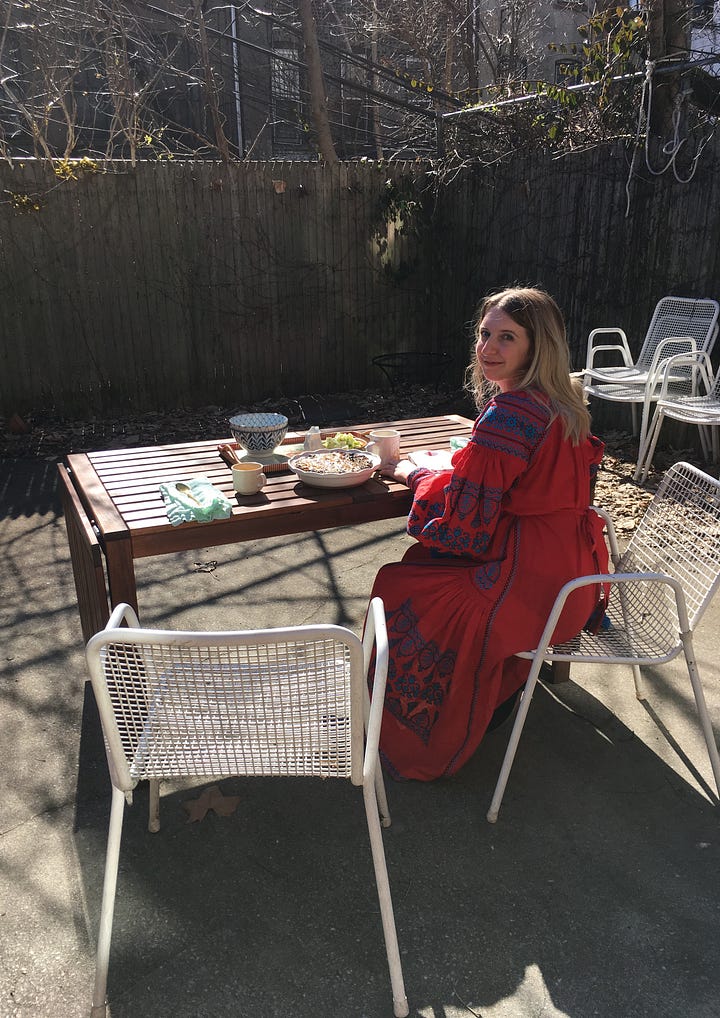
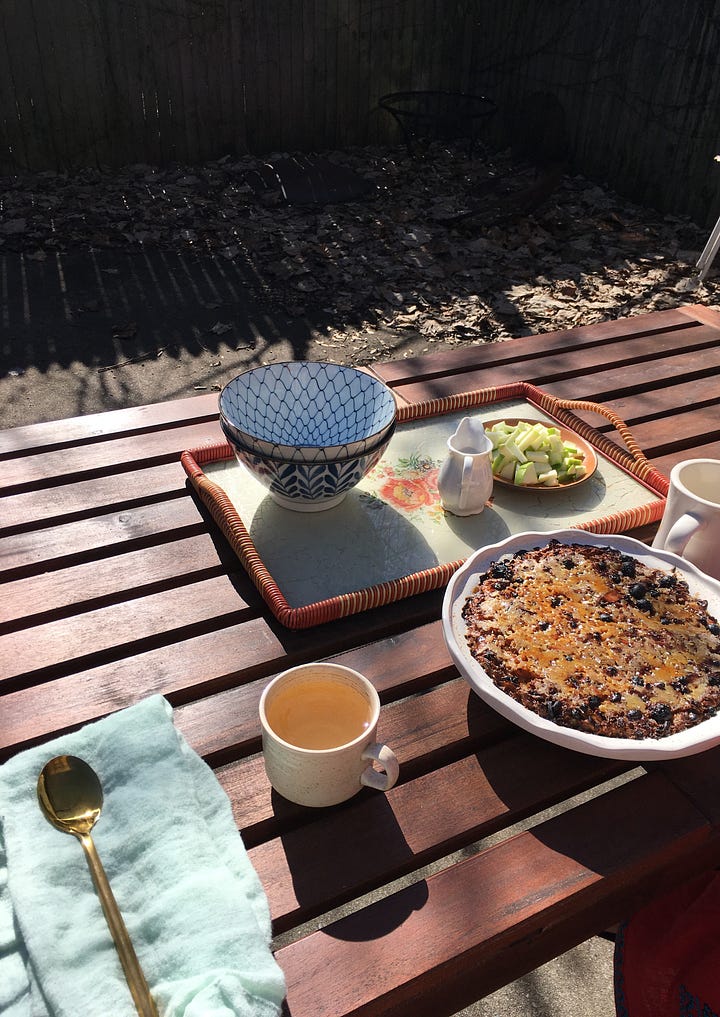
vōx: Just in the past few years, as my body became more disabled and as COVID turned the music industry on its head, I’ve questioned whether I should continue as a musician. The real question became: if I can’t do x, y, and z, am I still even a musician? Ultimately, this led me to: how can I carve my own path? What does a path even look like for a disabled musician?
I know you have gone through similar thoughts within your career. What made you ultimately decide to leave behind your project, White Hinterland?
CD: The band name was Dead Oceans' idea, and I was grateful for it. It gave me an anonymity I needed then, and I liked having a sense of provenance for the work. I was 21 when my first record came out. Engagement online shifted dramatically between 2004-2010. I started burning physical copies of demos onto a CD-R and sending those to labels and publicists. Music journalism was still mostly long-form, even Pitchfork. Then, around 2008, when YouTube exploded after the Superbowl (justice for Janet!), photography and video eclipsed everything.
Many other femme indie artists were far more savvy in this area than I ever was. I didn’t understand how to move with the camera at all. I think of St. Vincent's early album covers, like Marry Me, where she's staring directly into the camera's lens. Here I am. It’s gripping, like how I feel about Doechii. Their style, sense of self, and ability to engage with a lens. How often can I watch their Tiny Desk before it's unhealthy?
In hindsight, I think I gravitated to the moniker because I was looking to queer that space for myself. Have no gender at all. I wanted to operate like how a lot of my male peers and label mates could—just another weird little guy building worlds. I wanted so badly to be a shapeless body in flannel and fuck off to nowhere. There wasn't much room for varied gender representation in 2010. I look at artists now, especially Billie Eilish or all of boygenius, and I think: Thank god. There’s a lot more lateral space to express oneself, or at least, I hope that’s the case.
vōx: I hadn’t thought about how being a musician changed just from social media. I think of artists I grew up loving, and if you were an indie artist in 2005, maybe you’d do a few press photos or a music video around an album release. But other than that, you really weren’t creating the way the world is now, a constant churn of visual output on social media. It is exhausting!
CD: I have no idea how other people keep up. I’m still most comfortable dressing like a teenage boy on his way to church. I consider you a master at balancing songwriting with visual storytelling. You're constantly pushing boundaries. I’m curious how you got here. When did you realize you wanted to incorporate this into your process?
vōx: I can totally relate to feelings of discomfort and inadequacy in front of a camera and building a visual world. This is where I started, too. And in some ways, I still feel that, but I just have enough data now to disprove the thoughts. You know?
I knew around 2013 that I wanted to wipe my musical slate clean. I had been Sarah Winters, singer-songwriter, player of open mics, photographed in black and white at a piano. I was inspired by other female artists who were just coming on the scene then–Twigs, BANKS, Lorde,
. Their inspiration helped me form where I wanted to go. I wanted to create a mysterious, fearless creature to perform within. I wanted a big visual world. I wanted a moody, sparse electronic sound. And from there, I stumbled around for a few years, attempting to curate my social media to fit the aesthetics I dreamed of.CD: How does playing with imagery these days feel, given all the changes in your life?
vōx: I think it’s both more precious and less precious these days. I’m trying to infuse more vulnerability and humanity into my imagery now—less fearless creature, more fearful but still ok creature. The preciousness I feel lies in the fact that now, doing a photoshoot is going to leave me incredibly sick, in mounds of pain, for probably a week after I’ve done it. So it means more. It has to! If I’m going to do it, the suffering has to be for something.
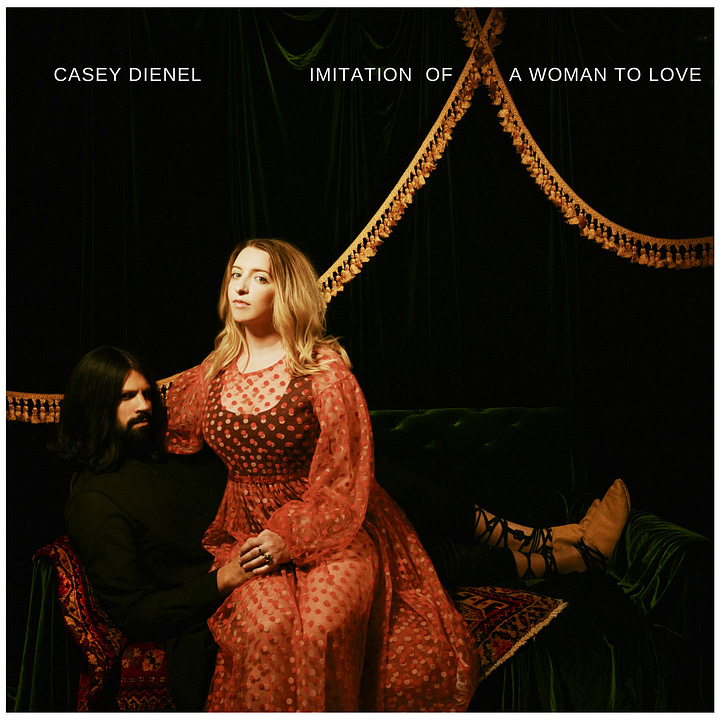
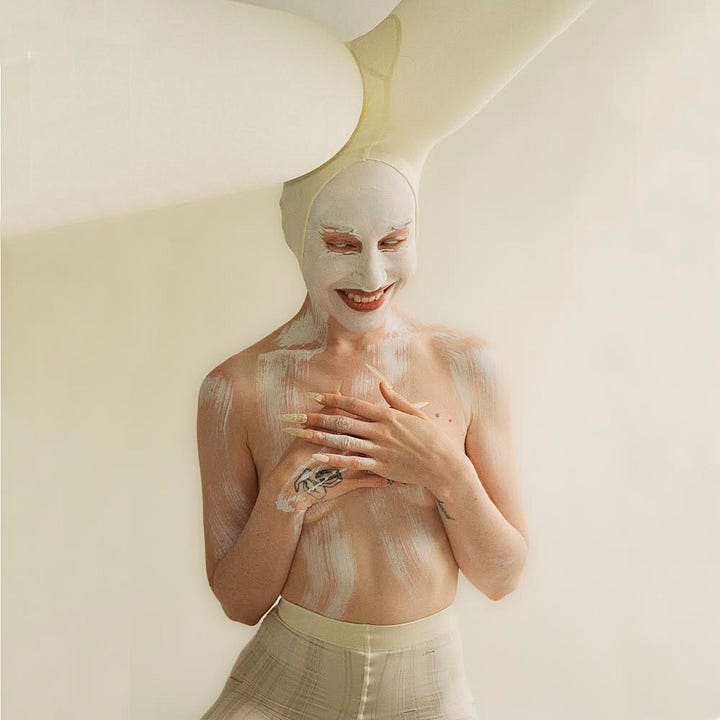
vōx: What has the process been like since leaving the music industry?
CD: I set a timer where if I couldn't financially break even by a certain point, I had to find an alternative source of income. Touring was always a major drain on my finances, but licensing and some record sales remained. Then Spotify cut into that. The other day, I got a request to feed my music into AI LLM models, which was depressing. It’s a bummer that the ways we’re looking to “innovate” music are still rooted in grift. Anyway, this thing I loved doing—well, the math wasn't math-ing. Many instances on the road felt unsafe, and I'd sustained myself in those spaces for many years without questioning it or demanding better conditions. The burnout I felt was so deep at the roots that it took my therapist pointing it out to me—you don't have to stay in this defense crouch position, you know? You could try something else.
It was like the idea had never occurred to me before. I was so used to that patriarchal model of faking it 'til you made it, you know?
vōx: I can totally relate. I think also, maybe it’s a combo of my Capricorn and my autism, but once I get going on a path or a goal or a routine, I have a really hard time seeing that I can just stop. Or pivot!
CD: Totally! I felt like a high-school dropout, except I was 32. For the first year, I worked in this high-end ceramics shop in Williamsburg, where my music constantly came on Pandora. I’d be wrapping someone’s $350 Malka Dina bowl, Zoe Kravitz and Lisa Bonet would come in with their iced coffees to look at jewelry, and like ‘Icarus’ would come on over the loudspeaker. I mean this in the best way—it brought me back down to earth. It freed me up to start figuring out how I want to live.
Basically, I can quit the industry, but I don’t have to quit being an artist. I noticed what I was really leading with, y’know? Not, like, “What do you want to make during your short time here on earth?” but instead “What do I have to do so no one thinks I’m a loser?”
I started gardening around the same time, which changed my relationship with failure. You fuck up constantly in gardening. The slugs and snails ravage your dahlias. The birds get the blueberries before you do. You put a plant in a place it’s unhappy with, and surprise! It’s not happy there. Then you see your roses return after a hard prune where you thought you overdid it. Or a plant migrates to a section of the garden where it’s happier. It corrects itself. If these plants can give themselves grace, I can do the same. That chapter proved I can care for myself during a break-glass moment.
vōx: I know you’re working on new music. Where does your creative process fit in the “music industry” today? Does it even need to anymore?
CD: Some of my friends are in that 1 percent of musicians who “made it,” and it contextualizes things. Playing on television or selling out Madison Square Garden wouldn’t necessarily make me happier. What I’ve observed is that the pressures don’t let up as you get bigger. They just morph and scale into new ones. I’m so happy to see friends on SNL, but maybe because we’re all older now, we know it’s all a bit random. My goals with this are just different—music is my art project. It’s ok that it’s not this big commercial gambit.
My creative process has remained the same, but it has to fit within my work schedule, which has helped me stay consistent. Ideas come to me in these big bursts, usually in the middle of the night. But the actual refinement happens between 6 and 9 am most days. After lockdown, I was eager to return to a larger space and play with other musicians, so I’ve been working out of LA, NY, and Vermont—like a week on, two months off. The next record’s all live-tracked, musicians in one room. But to be able to afford to work this way is, strangely enough, only possible because of “quitting.” Sorry to spend this whole interview talking about money, but I think it’s worth demystifying. Working this way was out of the question for most of my career as a professional musician.
If I make anything, I need it to be a good hang, not just for me but for everyone involved. Thanks to my day job, I can hire collaborators. I played 98% of what’s on Imitation of a Woman to Love, and I’m so proud I did that. But I brought on Adam Schatz to produce for the record I just wrapped. With Schatz, I could offset some of the cognitive load self-production takes. We both love to cook, he’s got an insane ear, and we generate a lot of good momentum together. We did a lot of album prep—demos, charts, arrangements.
By the time we started tracking, my main duty was to enjoy myself—which in and of itself is a style of leadership that feels most “me.” The figurehead is responsible for setting the tone for everybody at the session, so it starts with me if I want things to be loose and fun. I make sure I go to bed early, drink plenty of water, and show up warmed up and relaxed.
vōx: I love this! I’ve also been on the same path of realizing I was doing things ‘to look cool’ vs because I actually wanted to. Losing all my strength, energy, and peace to chronic illness put it into stark perspective for me. Especially just from the standpoint of, if I can only do one thing as an artist this day, this week, this month, or even this year–what is it truly?
CD: Part of getting older is realizing you have nothing to prove. 100% of my perfectionism will go unnoticed by at least 99% of people. Sure, I can engineer my vocals at home, but why? Recording at Altamira Sound with a producer like Rob Shelton sounds much better. Most of this record is a product of excellent engineering. You don’t need a dozen plug-ins when the strings are mic’d properly. In particular, a great room sound on drums takes a lot more time to replicate in the box than it does to do in person.
Does any of it fit into the industry? I don’t even know. I hope there is still room for weirdo artists to release work and have it find its home. It is harder to get things up and running without the infrastructure I had, but after spending 20 years worrying, I’d like to spend the next 20 letting myself off the hook. What about you?
vōx: Sometimes I feel like I’ve also essentially left the music industry, too. I probably won’t ever tour again, not in the way that the music industry does it. I probably won’t ever make visual art in that same way again. I can’t do a 10-hour music video shoot. Even doing sessions, I’ve got 2-3 hours in me tops. I relate to letting myself off the hook these days. I’ve been practicing non-judgement within myself a lot.
CD: There’s a line from this song called Sucker on the record about putting out deck chairs for the iceberg. Being a professional musician can feel a bit like that. Having 7 years away and coming back, it’s interesting to see that even some of the more artist-friendly models are hegemonic in operation, like automated screening or evaluating artists on their metrics without ever listening to the music first. This feels like a false economy. I started out before content creation was a thing, so maybe I’m biased, but aren’t we all a little bit exhausted trying to keep up? There are some things the algo can’t solve for or predict, and I think there are a lot of people out there craving what I am. Human connection. I know when I listen to your songs, I feel less alone.
When shit hits the fan, the first place I go to for solace is music. It will always be where I go to heal, and that makes me feel okay with not putting in as much energy to monetize it. What it gives back to me is much more important.
vōx: Music is also where I go to heal; this is the root of all my creativity. Writing my latest album helped me process so much shit. If I can help someone else heal through my art, then that’s all the success I need.
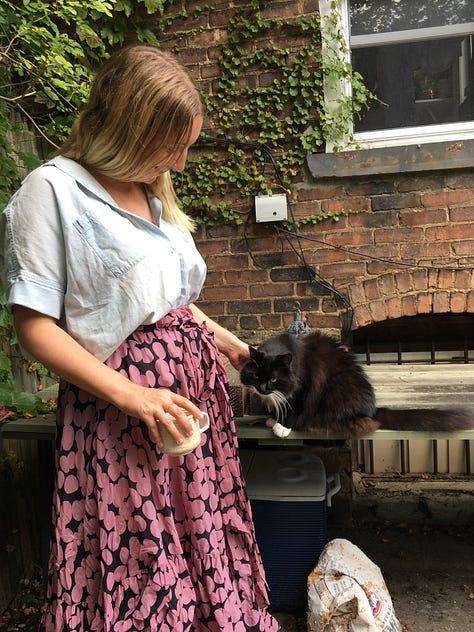
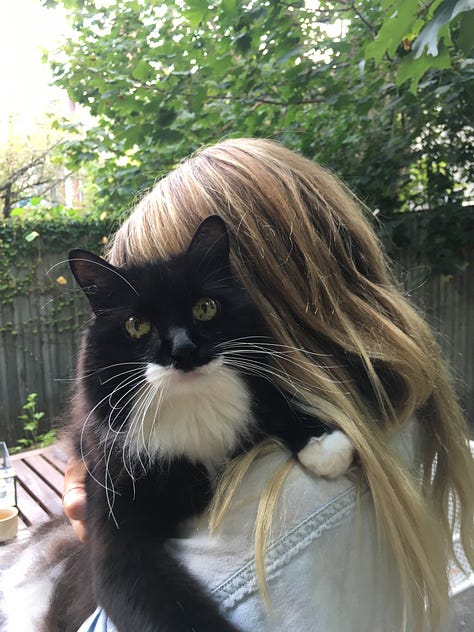
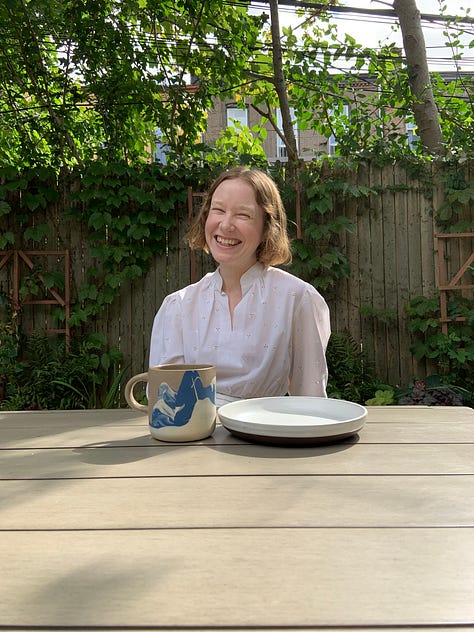
vōx: At age 35, I finally got an autism diagnosis. Honestly, it felt like a huge relief. It’s allowed me to see my past through this new lens. It’s allowed me to be kinder to myself. It’s been a series of aha moments. For example, when I realized I didn’t have anger issues, I have autistic meltdowns. And when I performed last year for the first time since my diagnosis, I realized my stage fright was actually just sensory overwhelm.
How has your neurodivergence reframed your past? How has it affected how you move through the world as a human?
CD: Oh man, 100%. There was a mix of the relief you describe and grief—honestly, like how coming out in my 30s felt. It’s required a lot of self-compassion. Like in many of my straight, monogamous relationships, there was always this tension I couldn’t put my finger on. What was I doing wrong? Why couldn’t I just be “a good girlfriend?” I feel a lot of compassion for how much judgment I put on myself.
vōx: What about as an artist?
CD: Neurospiciness is my superpower. That ability to sustain focus is fantastic for writing. My sensitivity to everything gives me a deeper well to draw from. Because I have to work a little harder to communicate or string specific thoughts together, it’s strengthened my ability to pack a verse with more interesting imagery and get hyper-specific. That groove in my brain is well-established. And when I’m working through a song, my brain is my favorite place to be. I’m not saying I never get frustrated or stuck, but even so, it’s like a crossword puzzle. I find it so pleasurable and chewy.
vōx: When did you begin to suspect you were neurodivergent, and how has that unfolded your perceptions of yourself?
CD: I can’t say it was a huge surprise because my family has a high instance of it. An ex once suggested it during a fight (little did they know they were right). It helps that my sensitivities and needs are not that unique in my family unit. I’ve always struggled with relating to others, but I’ve got a white belt in masking. Very sensitive to texture, sound, and light. Not great at hiding my excitement or my displeasure. But I can appear gregarious and extroverted when I need to or adopt/mimic cues to help people feel more at ease talking to me. I think people sometimes assume that we aren’t interested in how others feel when the opposite is true. I give all the fucks about how those close to me feel, and how the ways I come across may affect them. What do you think?
vōx: Yes, I also give all the fucks! It can take me longer to figure out why, but I think the deep processing we do to get to the same places neurotypical people naturally go shows how much we care.
I’ve also come to realize how much my masking is harming me. Just in the past year, I’ve made significant life changes to try and recover from my burnout. I haven’t reached recovery yet, but it’s helped me learn how to advocate for my needs in a way I never have before. And a side effect of that is I’m building trust with myself again. Each time I advocate for myself, it’s me telling myself–I got you. I’ll protect you from the big bad world.
CD: I didn’t make the connection between my masking and burnout until recently. For instance, when I came home from tour, I needed to be alone in a dark room for a week. My immune system would get so fried, and I was dissociating to just “power through.” We don’t power through anything anymore. To this day, I still require a lot of alone time. It’s not always easy for the people I date. But without that time to recenter, I can’t regulate. I can come off intense or moody when I’m just out of spoons and need a snack or a lie-down. It’s another reason I prefer living alone. Movement and time outdoors helps, too. Look at me, on my Mary Oliver shit.
vōx: Quiet and nature are also my most significant healing components! And I’ve gotten into meditation and somatic movement this year. I do them daily for at least a few minutes.
CD: Besides therapy, seeking out more community has been the most healing. On my birthday recently, the bulk of us were queer and spectrum-y in some way. One texted her food texture sensitivities ahead of time (I love that), and there was almost zero small talk. Heaven. Seeing how my best friend manages boundaries and self-advocates gives me examples to work with. I’m such a literal person that at times, it’s like if you’re short and can’t see the top shelf of the cupboard, anything up there doesn’t exist. He helps me remember what else is on the top shelf. We’re both big voice note people.
vōx: Shout out to the ‘out of sight, out of mind’ literalness of our brains. Me too! I’ve learned to lean into it. My To Do List probably looks silly to other people, but I won’t remember unless I write it down.
CD: Same! I could easily stare at the wall all day without a list to help me through it.
I feel like I’ve watched you commit to finding your voice and exploring it—I’d love to know what that feels or looks like for you, especially as you lean more into prose writing.
vōx: It came as a surprise for me. Snuck up on me! There’s been a subtle shift in my approach to writing in a longer form. I’ve been trying to decipher what changed. I think part of it is just a newly found confidence; maybe it naturally comes with entering your late 30s, or maybe part of it for me is tied up in knowing I’m autistic. I feel like that diagnosis helped me blossom. The better you know yourself, the more confidence and solidity it brings. It also led to many revelations I felt would help others if I shared them. It made my path clear.
I used to hate writing essays, or prose, etc. My whole life! It felt like a chore. The only writing I enjoyed was lyrical. I judged my writing rather harshly, and that made it unfun. In the past few years, I’ve learned how to exist as a human non-judgmentally. I’ve traveled more deeply into meditation and Buddhist practices, and things like equanimity have transformed my life.
I arrived at a place mentally where something had to give. Living in a body full of constant pain, I had to learn how to give myself relief. There’s the pain that you can’t change, whatever is actually happening, but then there’s the pain that you choose to pile on top of that—the pain of judgment or resistance. I can’t change the first part, but I have control over how I react or respond. That’s equanimity–accepting a situation as it is, rather than resisting it, and approaching it with curiosity instead of judgment.
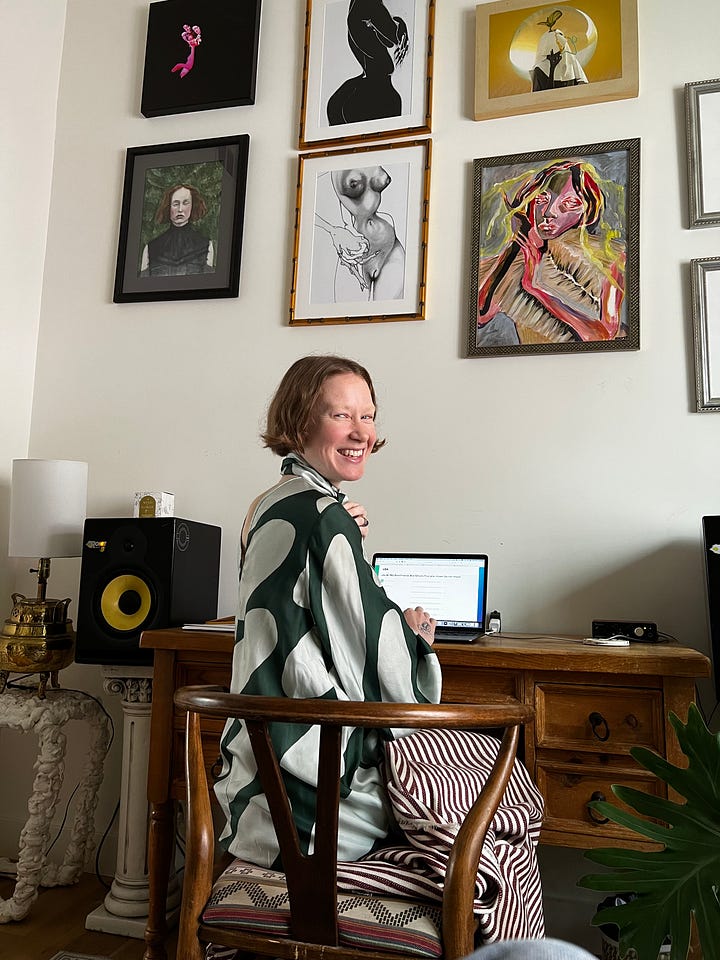
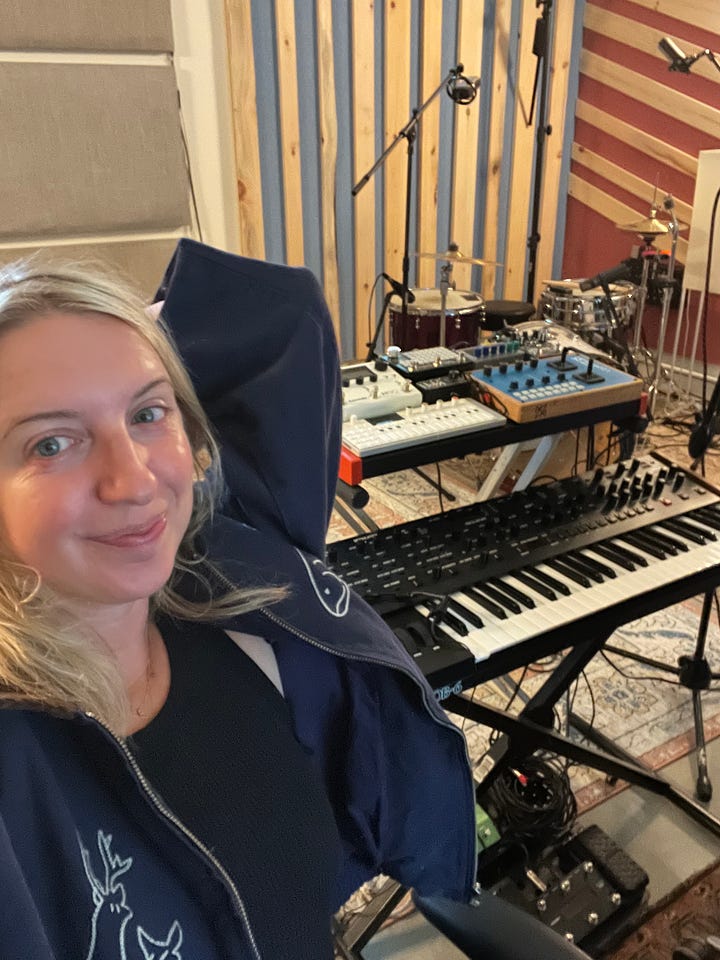
CD: We both have traveled so much. Does your creativity shift depending on where you are? Do different landscapes or cities bring out different sounds or stories?
vōx: I think it’s interesting that I don’t feel like my creativity shifts depending on where I am. My creativity feels so tightly wound around me that environment doesn’t seem to breach it.
One thing that changes my songwriting is the sound of the instrument I’m writing on. I almost always write on a piano, but the vibe and sound of each piano differs greatly—especially once you include everything from an electric keyboard to a grand piano.
My favorite to write on is a darkly moody upright piano, perhaps one with a very tall body to bring depth to its sound. I remember living briefly in Portland in 2012 with an amazing musician, Brent Knopf, and the piano in his house was a living, breathing creature. I adored the sound of that piano. It made me feel dramatic. Many years later, I ended up texting him, like, “What kind of piano is that?!”
I’d love to hear how your creativity morphs via environment!
CD: I remember Brent, such an incredible player.
My favorite pianists can coax this supernatural, almost aquatic expression out of the piano—you know how rigid the mechanics of the soundboard and keys can be. So, when I hear, like, Keith Jarrett make it sing, turn the action soft while the motifs retain this incredible density, that’s my favorite. Paris Concert, The Köln Concert, and Dark Intervals have always been big touchstones. He’s the reason I got my Steinway. I heard someone tuning it across the showroom 15 years ago, and it was like when you lock eyes with someone at a party, love at first sight, or whatever. You know you’re in trouble. My intuition knows most things long before I do.
I’m a double water sign, so I’m fucking porous. The weather, the location, the time of day. But travel is less an escape hatch and more for when I feel extroverted. My friend groups are all spread out. No matter where I am, my creative habits stay the same. Sitting at my desk or the piano, I can’t write as well, so I do a lot of dictating while walking my dog or swimming. I was in London a few weeks ago, where I walked everywhere and took voice memos. I probably looked crazy, muttering to myself in Regent’s Park. But I love writing away from an instrument. I wrote a song on one of the flights to the session. 48 hours later, we recorded it on lunch break. I was trying to figure out what key it was in for meg (duffy) as they transcribed the changes. That freedom’s pretty delicious. They sound incredible on it. Having someone turn your 2-day-old song into this dusty, archival Ry Cooder cut is nothing short of magic.
vōx: I love to hear more intimately about how you create! It’s magical how processes differ so greatly between artists.
For me, I write best in a vacuum. I need a silent house, no one else inhabiting it, no distractions of sound or energy. When I sit down with my lyric book or at my piano, those objects have trained my brain to create. Like, when they’re in my hands they signal that now it’s time to write a song.
From there, if there are changes that need to be made sonically or lyrically, I like the time between awake and dreaming best. I’m especially potent as I lay falling asleep. I always keep a notepad by my bed to write down ideas for second verse lyrics. I rarely write a second verse upfront! It always comes much later for some reason.
Ok, Casey, this has been so lovely but I fear for the sake of our readers we may need to wrap it up shortly. As it is when we hang, we could chat forever! Are there any final thoughts you’d like to add? Is there anything you’d like to tell folks about your next album? About springtime? About what’s giving you life these days?
CD: I’m hoping to release the album later this year, so stay tuned. What’s keeping me afloat right now are the Rembrandt tulips coming up in the yard, Love in a F*cked-Up World by Dean Spade, and my very shady little dog. But most of all? Friendships like ours are what keep me going. Love you so much! Hope I get to see you in person soon.
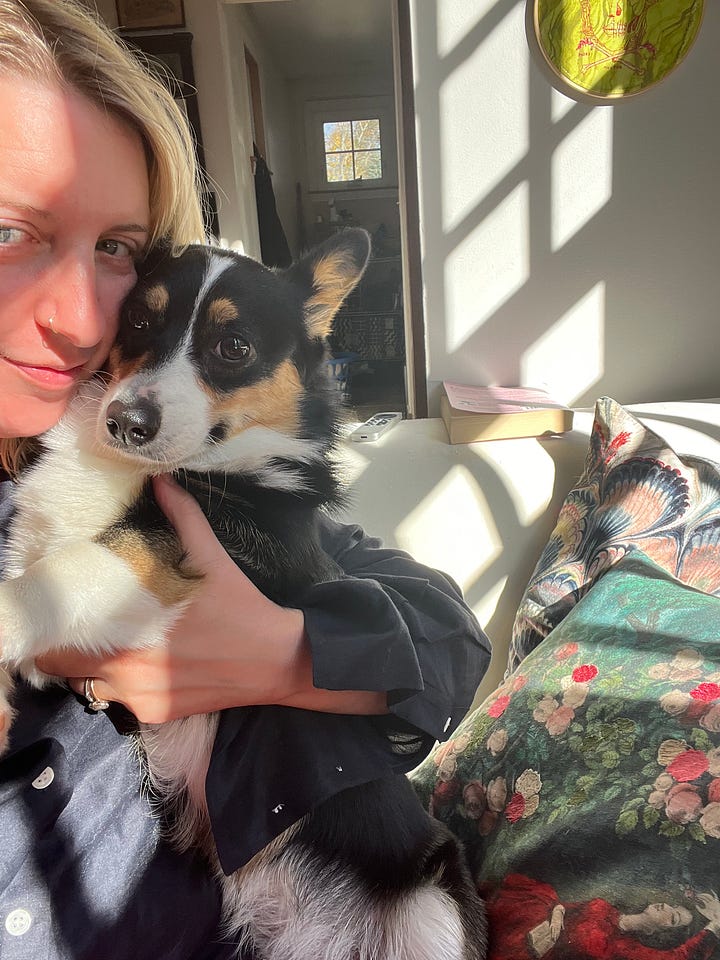
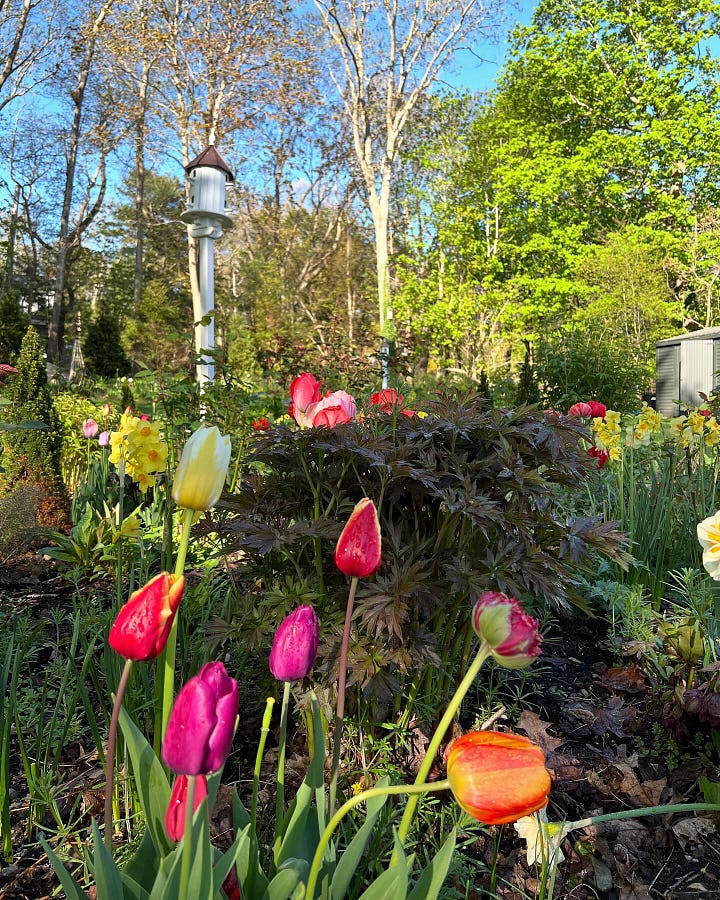






Casey- hearing why you quit for so long makes me feel like I made the right choice for myself to not do this work outside of my little metro-Boston area. I hated not knowing if I could trust people, especially men who said they knew someone who would “sign me” 🤣😭 and then berate me for not wanting to be famous, why don’t I want to be famous, etc. I was a gardener too and it was great cos I could sing as loud as I wanted (ppl I was gardening for long since dead - museum gardens) and write songs all day all night. I feel like art… you can’t help but make it if you’re an artist, and it doesn’t have to be monetized to be meaningful. Now my kids just say stuff like “you should play live for people” 🩷 thank you to both of you cos I can relax my shoulders a little about this all now.
I needed this in all the ways. I can’t even tell you how much this has helped my brain. Big hugs to you both. 💖🫶✨